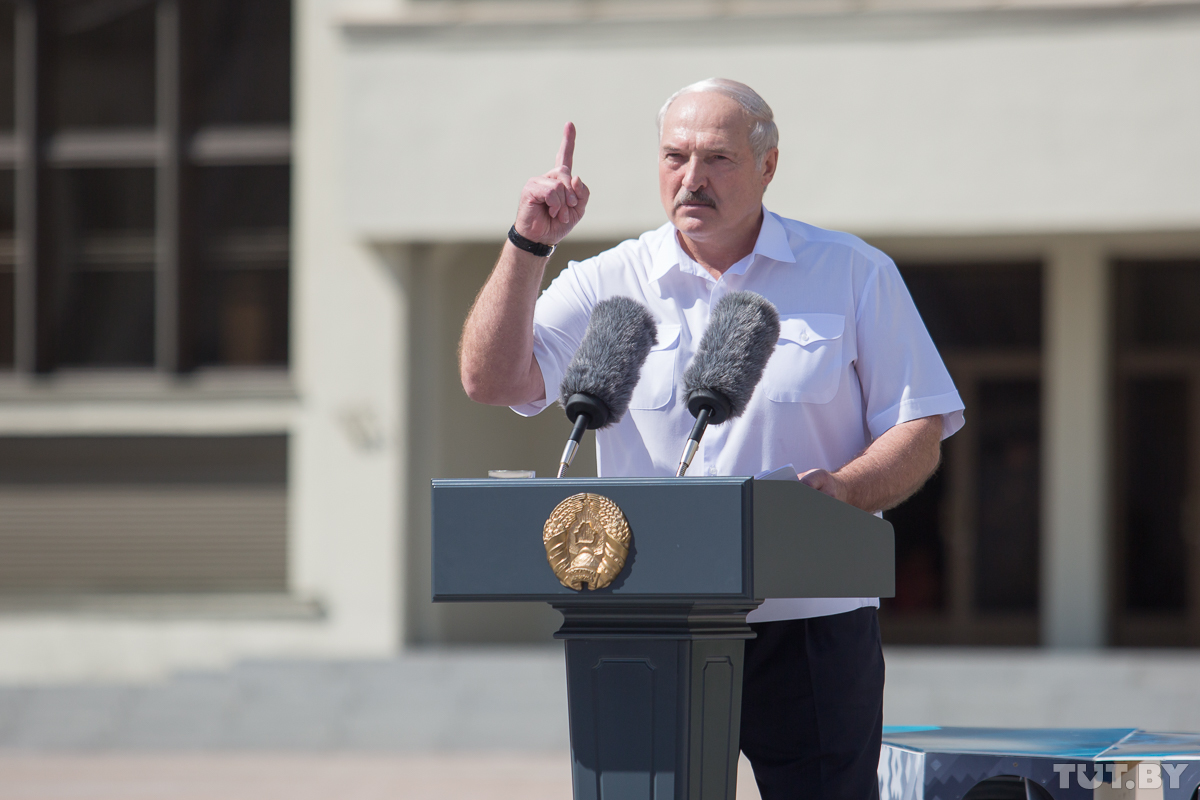RA’s Daily Russia News Blast – August 18, 2020

Today in Russia: “Tikhanovskaya had six times more votes than Lukashenko”; Lukashenko makes vague promise for more elections after he faces booing factory workers; Energy minister Novak contracts coronavirus; Vaccine chief in Russia says West trying to steal Russian scientists; Moscow exchange to open trading to 19 American companies; Norway arrests suspected Russian spy; Dmitry Trenin: Game over for Lukashenko and Moscow’s next move
Fury in Belarus against strongman Alexander Lukashenko continues unabated, and Russian media remains fixated on events across the border. Meduza spoke [in Russian] to members of election commissions, who “do not deny falsifications. On condition of anonymity, Meduza spoke with several members of the election commissions of Minsk about how people actually voted and why, honestly counting the votes, they could not prevent Lukashenka’s victory.”
Lukashenko faced a very unwelcome reception at the Minsk Wheel Tractor Plant (MZKT), where he faced booing from the gathered workers.
On Monday, August 17, Alexander Lukashenko continued his efforts to save his presidency by addressing a group he undoubtedly hoped would welcome his message: workers at the Minsk Wheel Tractor Plant (MZKT). Instead, he stumbled through what was probably his single hardest speech in 26 years as the Belarusian head of state. “You are working people. You have always supported the president!” Lukashenko said from atop a tractor-trailer. The crowd booed him and chanted “Resign!” despite the fact that police officers arrested several factory workers before the speech in an attempt to remove “unreliable” elements who might instigate the publicity nightmare that unfolded anyway.
At the MZKT plant, Lukashenko also promised changes to the constitution and said that once these changes take place new elections would be held. He declared, “This is what we will do, guys, we need to adopt a new constitution, the one that we want. Even the alternative supporters were not against it. You must pass it in a referendum, because the previous constitution was adopted by a referendum. And under the new constitution, if you want, to hold elections – for the parliament, for the president, and for new authorities.” Vedomosti noted [in Russian], however, that this is unlikely to satisfy the demands of protesters that he resign immediately.
Energy Minister Alexander Novak contracted coronavirus, Kommersant wrote [in Russian]. The head of the department is asymptomatic and will participate in the upcoming OPEC+ monitoring videoconference. Novak is not the first minister to contract the virus. Prime Minister Mikhail Mishustin contracted the virus as did numerous other officials.
“The head of Russia’s vaccine-development body has claimed that Western research institutions are seeking to “lure” away its scientists to work for them.Alexander Gintsburg alleged that attempts to poach scientists from Russia to work in Europe and the U.S. had not worked. Gintsburg is the head of the Gamaleya National Research Center for Epidemiology and Microbiology which developed Russia’s coronavirus vaccine that was given regulatory approval last week,” CNBC wrote. He offered no evidence for the allegation.
“The Moscow Exchange will launch [in Russian] trading in shares of 19 American companies on August 24 . Among them are Microsoft, Amazon, Facebook, Twitter, Alphabet (parent company of Google), ExxonMobil, Boeing, Intel. On September 7, trading in Apple shares will start – the delay is due to their splitting [in Russian],” The Bell wrote [in Russian].
Norway arrested a suspected Russian spy. “‘The man is formally suspected of providing information to a foreign country that could damage fundamental national interests,’ the PST intelligence agency wrote on Twitter. A PST official later confirmed the country in question was Russia.”The person arrested held meetings with an officer from the Russian intelligence agency,” Line Nyvoll Nygaard told TV2 Nyhetskanalen television.“
Dmitry Trenin, the head of the Carnegie Moscow Center wrote that it is “Game Over for Lukashenko.” He wrote,
The broad pattern of what’s happening in Belarus right now was anticipated months in advance. Before the election, President Alexander Lukashenko would eliminate any serious challengers, leaving only those whom he could beat without too much trouble; the vote itself would be rigged; the proclamation of Lukashenko’s victory at the polls would lead to protests; Lukashenko would put down the protests using brute force; he would then brush off outside criticism as interference in Belarus’s internal affairs, and remain in power. In other words, a replay of the 2010 elections scenario all over again.
Yet against expectations, several elements have substantially, even crucially changed the picture. One was the Wagner incident: a bizarre operation in which the Belarusian KGB arrested thirty-three suspected Russian mercenaries eleven days before the vote and accused them of having come to Minsk to stir up trouble during the elections. The arrests allowed Lukashenko to ramp up his anti-Russian rhetoric. The Kremlin, bewildered, saw this as the Belarusian ruler’s attempt to win acquiescence in the West for his re-election on a pro-sovereignty, anti-Russian ticket. Whatever trust had remained in Lukashenko in Moscow completely evaporated.
The second element was the perseverance of protesters in Minsk and across Belarus, who did not give up after several days of protest, despite being manhandled — and in many cases, savagely beaten — by the police. The brutality that Lukashenko had hoped would, as before, nip the protests in the bud led to the opposite result of widespread indignation and anger. This in turn led to the third unanticipated result: the expansion of the protests beyond the usual crowd of young Europe-orientated urbanites to include older people, even those who a couple of days before might have actually voted for Lukashenko in the election.
PHOTO: Lukashenko did not receive as warm a welcome as he might have hoped as he visited a tractor factory and addressed its workers – formerly a reliably pro-Lukashenko demographic (TUT.by).











